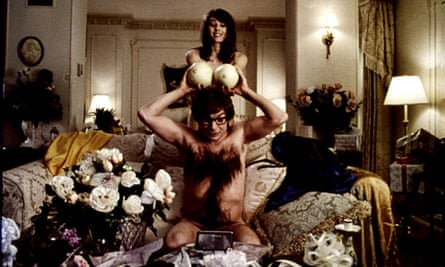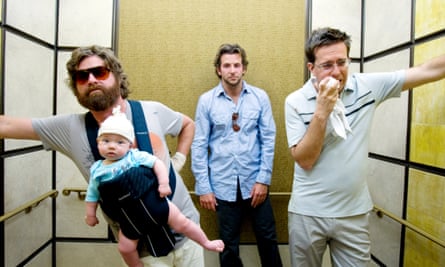A little over 20 years ago, There’s Something About Mary spearheaded a new era for what was known as gross-out comedy. The film depicted Cameron Diaz’s central character with semen in her hair and Ben Stiller having a zipper accident, which probably helped birth the American Pie series, which in turn spawned such films as Road Trip and The Hangover. Cut to the present, and the young upstart directors of these movies have recast themselves as purveyors of cerebral, political arthouse cinema.
Earlier this year Green Book, directed by Peter Farrelly (of There’s Something About Mary), was named best film of the year at the Oscars. Next year, Road Trip’s Todd Phillips – who also directed The Hangover movies – will almost certainly be in contention for awards with Joker. In between these films, there have been awards for The Big Short and Vice, by Saturday Night Live alumnus Adam McKay, and Jay Roach of Austin Powers fame has now directed Bombshell, a drama about sexual abuse at Fox News.

It is notable that a generation of directors who cut their teeth in comedy should now be making a certain type of critic-pleasing American cinema that tilts towards the political. Why them? Why now? In an email, McKay said: “Doing comedy means you have to be aware of the world around you in at least a slightly more active way. So it makes sense that if the world takes a strange or dark turn someone doing comedy would be sensitive to it.”
This strain of comedy is visible in McKay’s earlier work, which was noteworthy for the way it dealt with myopic men and the damage they wreak. It doesn’t feel too hard to trace a lineage from the grotesque that is Anchorman’s Ron Burgundy, who believes Diversity is “an old, old wooden ship that was used during the civil war era”, to the monsters of The Big Short and Dick Cheney in Vice. In The Big Short, Jared Vennett (Ryan Gosling) is similarly crass in a meeting room, pronouncing Ted Jiang’s name “Yang” and falsely claiming that “he doesn’t speak English”. Anchorman and Step Brothers both derive joy from scenes of male carnage that spill over into unchecked chaos. “That really got out of hand fast … Brick killed a guy,” Ron says, after a berserk streetfight with rival newscasters. Brick, we are told in the film’s coda, goes on to become “one of the top political advisors to the Bush White House”.

Phillips’ trajectory from no-holds-barred comedy to political drama jas parallels with McKay’s. The Hangover films also focused on spoilt men: bros on a stag do who get up to various gross japes. It’s a portrait of basic masculinity that could have been more critical. Maybe it is fitting that Obama-era American schlubs would find their Trump-era counterpart in the more worrying figure of Arthur Fleck, the Joker, whose paranoia and misanthropy align him with a beta-male American type that we have become familiar with from episodes such as Gamergate. Phillips could do more to underline the racial component of his set-up, as the figure of the estranged white man is nothing without mentioning white supremacy. Indeed, the New Yorker critic Richard Brody argued that the film whitewashes racist attacks on black people while alluding to the Central Park Five and the murder of four black teenagers by Bernhard Goetz in 1984.
This dimension to Joker, which presents itself as a political work, is of a piece with comments Phillips has made about how comedy is no longer possible in our PC age. “Go try to be funny nowadays with this woke culture,” Phillips said to Vanity Fair. His film quite disarmingly plays on the boundaries between comedy and evil, via its disturbed central figure. In a brilliant scene, Phillips stages what looks like a comedy setup, where the Joker entraps a dwarf in his apartment: the latter cannot reach the safety latch to let himself out and has to ask the villain for help. The scene uses comedy smarts to achieve its goals, by flipping what might have been played as a “politically incorrect” scenario so that it becomes wholly disquieting. Phillips uses the audience’s appalled reaction, and the way we are almost conditioned to expect a gag here, to create horrific bathos.
McKay reacted with scorn at the suggestion that there was something unusual in comedy directors turning to more “serious” work. “I’m always surprised people are so fascinated by a writer, director, actor or anyone going from comedic to dramatic work. It happens constantly. Among the all time greats you see it with Fellini, Woody Allen, Kurosawa and more recently Bong Joon-ho with Parasite.” This is true, although these directors are not so much dipping between modes as taking a turn from straight-up comedy to the overtly topical.

This shift is all the more notable in an era when satire has arguably lost the capacity to take down its subjects . In an article for the LRB in 2013 about the rise of Boris Johnson, Jonathan Coe argued that Have I Got News for You, far from skewering the politician, had in fact enabled and promoted him. Something said could be said of Donald Trump and Saturday Night Live, the programme insisting on painting the president as a buffoon rather than a malignant force, and even had him host the show in 2015, when he was a presidential candidate. It’s interesting that the worlds of light comedy – SNL and all the late-night shows – and political commentary seem so deeply intertwined in the US.
It may be that future political situations, ones less marked by discord, will see us pivot back to insouciant fun, but as things stand we’re increasingly looking to the purveyors of yesterday’s laughs to raise serious questions about our time.

Comments (…)
Sign in or create your Guardian account to join the discussion